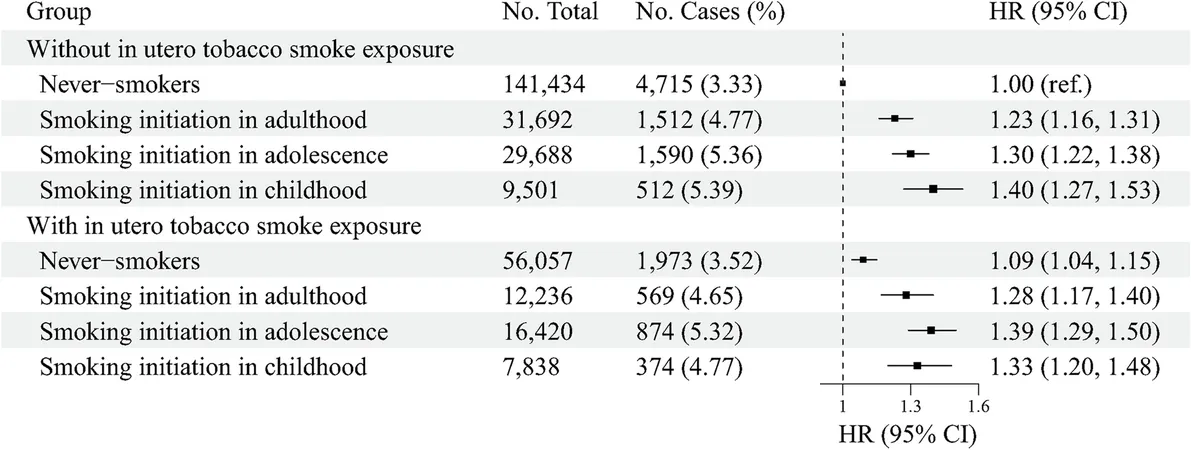
Unveiling the Risk: How Early Tobacco Smoke Exposure and Physical Activity Can Influence Chronic Kidney Disease in Adulthood
2024-11-11
Author: Yu
Chronic Kidney Disease (CKD) has emerged as a global health crisis, affecting over 10% of the world's population and becoming a leading cause of morbidity and mortality. This progressive condition is characterized by the irreversible deterioration of kidney structure and function, severely impacting individuals' quality of life. As medical professionals emphasize the need to address CKD risk factors, new research is shedding light on previously overlooked associations, particularly focusing on early-life tobacco exposure and lifestyle choices.
A recent study from the prestigious UK Biobank has found a concerning link between early-life exposure to tobacco smoke—whether in utero or during childhood and adolescence—and an increased risk for CKD in adulthood. This research aligns with Lucas’s programming theory, which posits that adverse environmental factors encountered during crucial developmental phases can have lasting effects throughout life. The evidence suggests that exposure to tobacco smoke early on can heighten the risks for various health issues, including cardiovascular disease and diabetes. However, this study is among the few that directly examine the relationship between early tobacco smoke exposure and CKD risk.
The study analyzed data from 502,401 participants aged 40 to 69 years, focusing on specific tobacco exposure categories: maternal smoking during pregnancy and age of smoking initiation. Alarmingly, findings showed that participants exposed to tobacco smoke in utero had a 8% higher risk of developing CKD compared to their unexposed counterparts. Moreover, the risks escalated significantly for individuals who began smoking in childhood or adolescence, showing a staggering 34% increased risk if they started smoking as children.
But that’s not all—physical activity emerges as a powerful mitigating factor. The World Health Organization advocates for regular physical activity as crucial for improving health outcomes, including those with chronic diseases like CKD. The study corroborates these claims, showing that individuals who engaged in recommended amounts of physical activity (150 minutes per week) had a 9% lower risk of developing CKD, compared to those who did not meet these guidelines.
Intriguingly, the protective effects of physical activity were most pronounced among those with a history of early tobacco smoke exposure. Participants who did not engage in recommended physical activity, combined with early-life tobacco exposure, demonstrated a compounded risk for CKD, highlighting the critical intersection of lifestyle and environmental factors.
With CKD on the rise, these findings underline the urgent need for public health initiatives aimed at preventing early tobacco exposure and promoting physical activity. It’s not just about reducing tobacco use; it's about fostering healthier lifestyles to combat and possibly prevent CKD from developing later in life.
To further contextualize these findings, the study's implications reach beyond individual health—suggesting urgent policy changes to implement smoke-free environments, especially for young people. By protecting youth from early tobacco exposure and encouraging physical fitness, we could drastically reduce the burden of CKD in future generations.
Given the complexity of CKD and its multiple contributing factors, future research is essential. The mechanisms behind the association of tobacco smoke with kidney function are still being explored, with potential links to oxidative stress and other biochemical processes that could hinder kidney health.
In conclusion, the evidence from this study reveals a troubling connection between early tobacco smoke exposure, physical activity, and CKD risk in adulthood. It emphasizes the multifaceted approach required in public health—to not only address smoking cessation but also promote an active lifestyle for healthier living. Parents, educators, and healthcare professionals must work together to safeguard the health of future generations by eliminating tobacco exposure and encouraging regular physical activity.





 Brasil (PT)
Brasil (PT)
 Canada (EN)
Canada (EN)
 Chile (ES)
Chile (ES)
 España (ES)
España (ES)
 France (FR)
France (FR)
 Hong Kong (EN)
Hong Kong (EN)
 Italia (IT)
Italia (IT)
 日本 (JA)
日本 (JA)
 Magyarország (HU)
Magyarország (HU)
 Norge (NO)
Norge (NO)
 Polska (PL)
Polska (PL)
 Schweiz (DE)
Schweiz (DE)
 Singapore (EN)
Singapore (EN)
 Sverige (SV)
Sverige (SV)
 Suomi (FI)
Suomi (FI)
 Türkiye (TR)
Türkiye (TR)